
Differentiation of inverse tan YouTube
Thus we have found the derivative of y = arcsin x, (6) d d x ( arcsin x) = 1 1 − x 2. Exercise 1. Use the same approach to determine the derivatives of y = arccos x, y = arctan x, and y = arccot x. Answer. Example 2: Finding the derivative of y = arcsec x. Find the derivative of y = arcsec x.

Find derivative dy/dx of x = tan y. Implicit Differentiation YouTube
How Wolfram|Alpha calculates derivatives. Wolfram|Alpha calls Wolfram Languages's D function, which uses a table of identities much larger than one would find in a standard calculus textbook. It uses well-known rules such as the linearity of the derivative, product rule, power rule, chain rule and so on. Additionally, D uses lesser-known rules.

Differentiation of tanx quotient rule YouTube
The differentiation of t a n − 1 x with respect to x is 1 1 + x 2. i.e. d d x t a n − 1 x = 1 1 + x 2. Proof using chain rule : Let y = t a n − 1 x. Then, t a n ( t a n − 1 x) = x tan y = x Differentiating both sides with respect to x, we get d d x (tan y) = d d x (x) d d x (tan y) = 1 By chain rule, s e c 2 y d y d x = 1 d y d x = 1 s e c 2 y
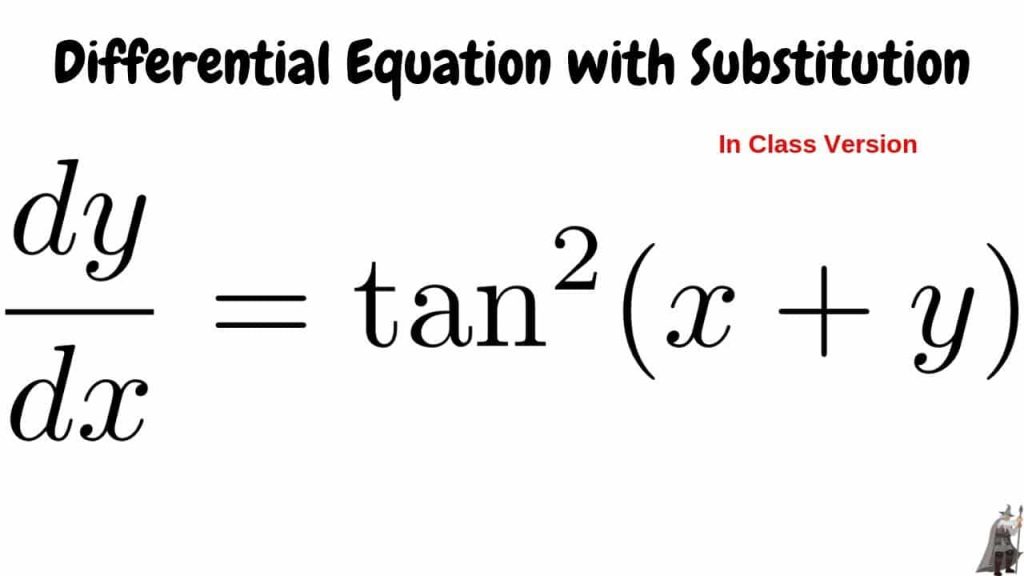
derivative of tanh Archives Get Education Bee
Since tan y=x, the tan ratio opposite/adjacent tells you that your opposite side is x and adjacent side is 1. Now use pythagorean theorem to find the hypoteneuse, which is sqrt (x^2+1). Then form cos y= 1/sqrt (x^2+1) and sub. it back into the above formula, squaring it to give you 1/ (1+x^2). •.

Derivative of tan(x) from first principles YouTube
What Is the Derivative of Tan^-1 x? The derivative of t a n − 1 x or arc tan (x) is the process of differentiating the arc tan trigonometric function with respect to "x". Tangent is a trigonometric function, and if we take the inverse of this function, then it is called the inverse tangent function or arc tan function.

Derivative of Tan Differentiation & Formula Video & Lesson Transcript
Example 3.5.2: Finding the Derivative of a Function Containing cos x. Find the derivative of g(x) = cosx 4x2. Solution. By applying the quotient rule, we have. g′ (x) = ( − sinx)4x2 − 8x(cosx) (4x2)2. Simplifying, we obtain. g′ (x) = − 4x2sinx − 8xcosx 16x4 = − xsinx − 2cosx 4x3.
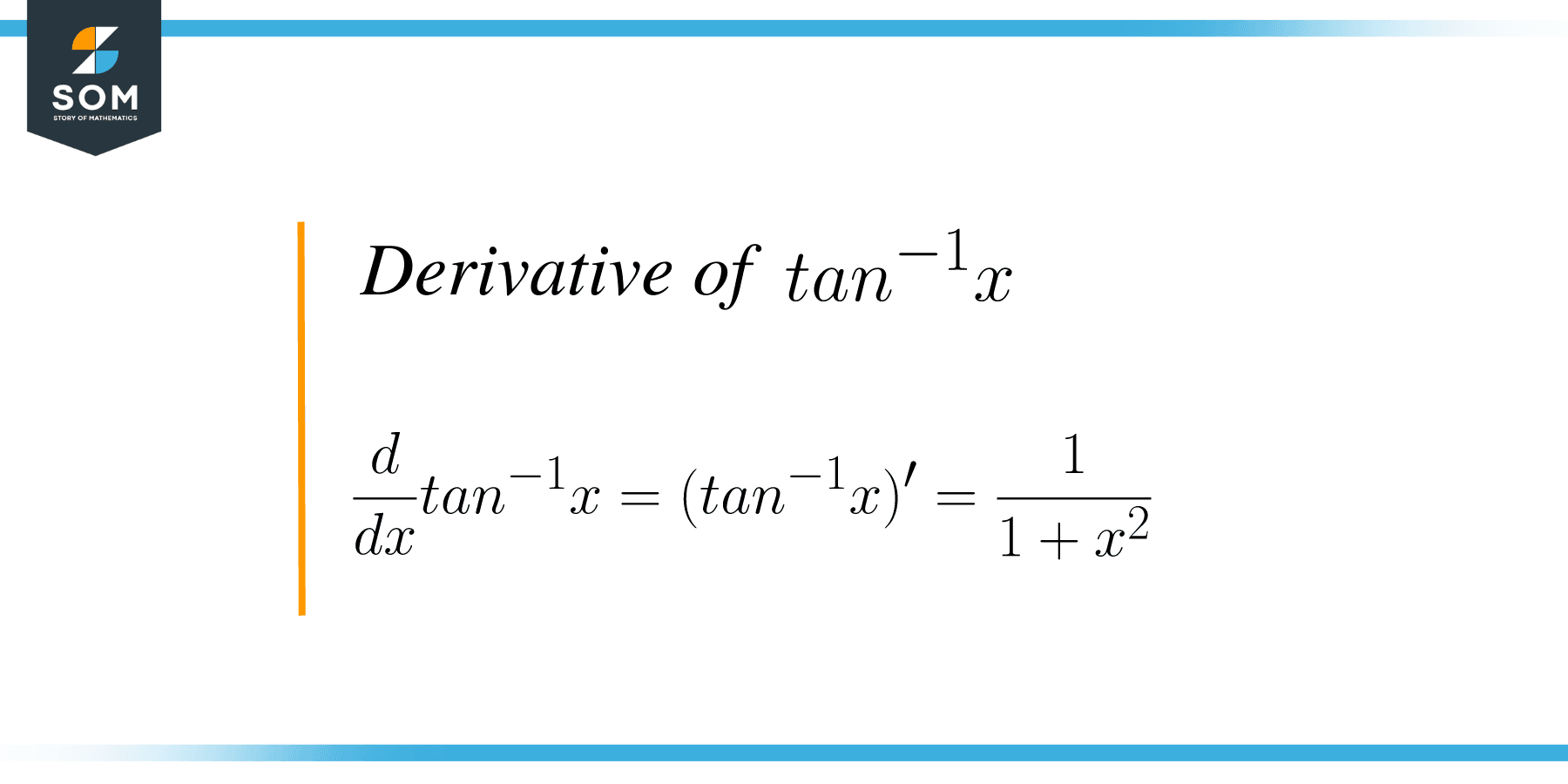
Derivative of Tan^1 x Detailed Explanation and Examples The Story of Mathematics A History
Symbolab is the best derivative calculator, solving first derivatives, second derivatives, higher order derivatives, derivative at a point, partial derivatives, implicit derivatives, derivatives using definition, and more. Is velocity the first or second derivative? Velocity is the first derivative of the position function.
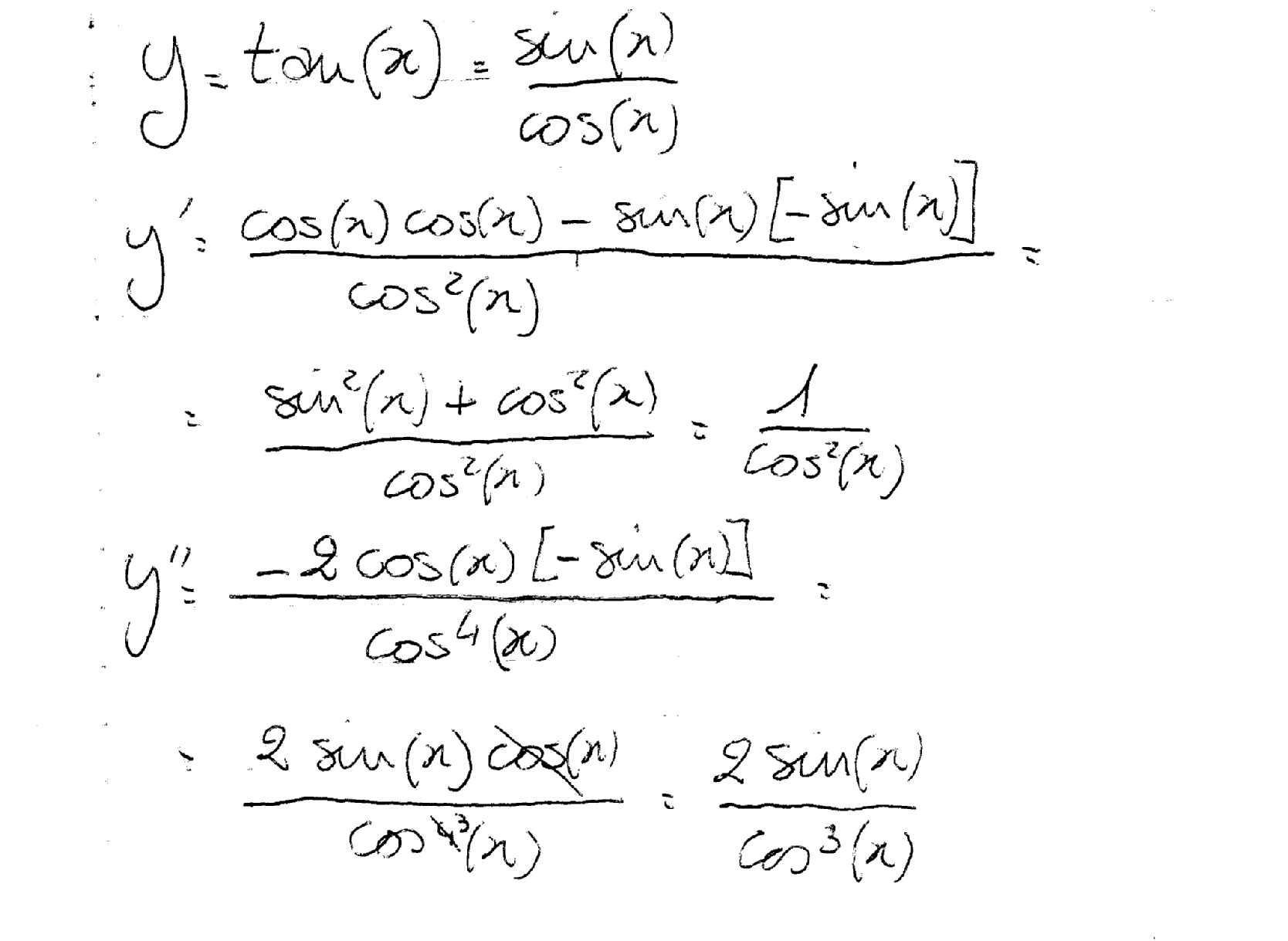
Derivative of Tangent Definition, equation, formula and more
1 Answer Truong-Son N. Jul 1, 2015 I seem to recall my professor forgetting how to deriving this. This is what I showed him: y = arctanx tany = x sec2y dy dx = 1 dy dx = 1 sec2y Since tany = x 1 and √12 +x2 = √1 +x2, sec2y = ( √1 + x2 1)2 = 1 + x2 ⇒ dy dx = 1 1 + x2 I think he originally intended to do this: dy dx = 1 sec2y sec2y = 1 + tan2y
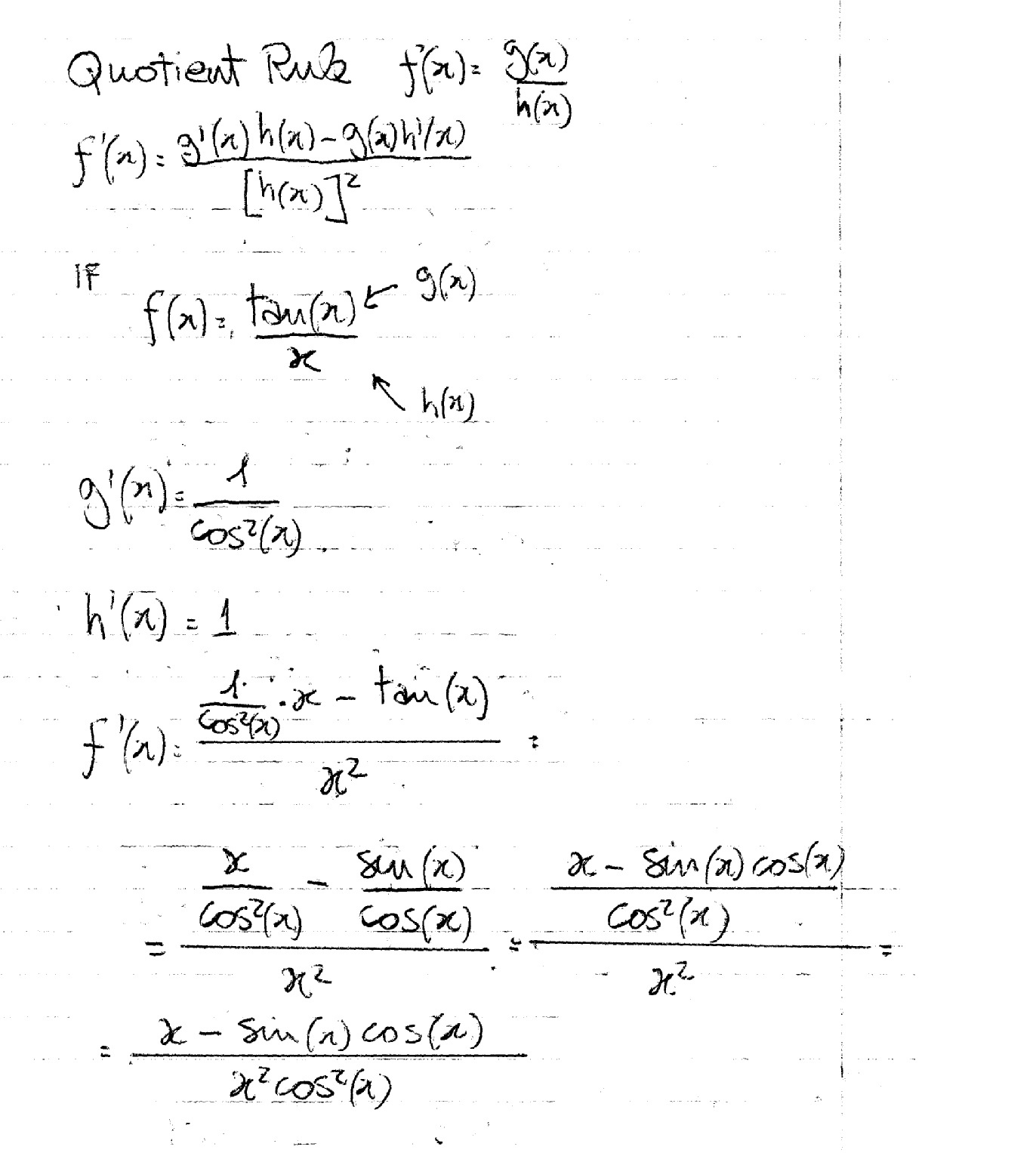
Derivative of Tangent x Formula, Rules, Examples
1 Answer Jim H Aug 4, 2015 Use the derivative of tan−1 and the chain rule. Explanation: The derivative of tan−1x is 1 1 +x2 (for "why", see note below) So, applying the chain rule, we get: d dx (tan−1u) = 1 1 +u2 ⋅ du dx In this question u = 2x, so we get: d dx (tan−12x) = 1 1 +(2x)2 ⋅ d dx (2x) = 2 1 + 4x2 Note If y = tan−1x, then tany = x

Differentiation of tan inverse x is ? Brainly.in
Derivatives Derivative Applications Limits Integrals Integral Applications Integral Approximation Series ODE Multivariable Calculus Laplace Transform Taylor/Maclaurin Series Fourier. (tan^{-1}x\right) en. Related Symbolab blog posts. Practice Makes Perfect. Learning math takes practice, lots of practice. Just like running, it takes practice.

Differentiation of tan^2(x) and (x^3+x)^4 YouTube
tan^-1(x) Natural Language; Math Input; Extended Keyboard Examples Upload Random. Compute answers using Wolfram's breakthrough technology & knowledgebase, relied on by millions of students & professionals. For math, science, nutrition, history, geography, engineering, mathematics, linguistics, sports, finance, music…
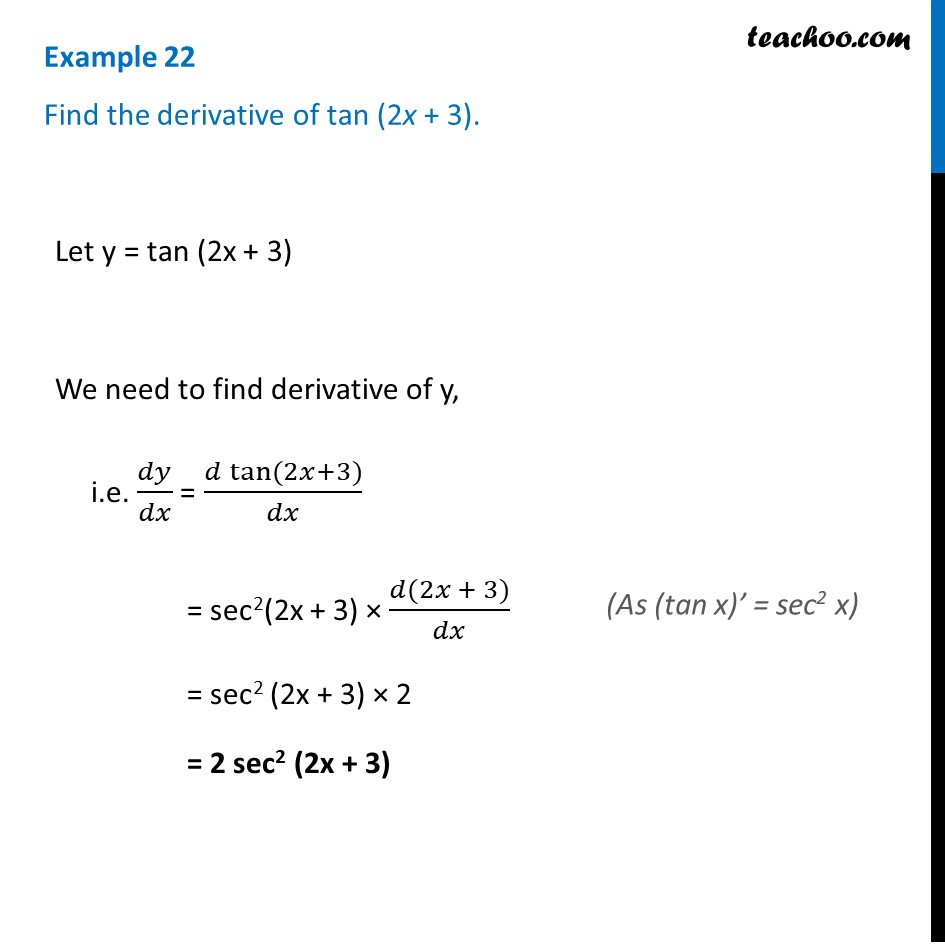
Question 1 Find derivative of tan (2x + 3) Chapter 5 Class 12
Free derivative calculator - differentiate functions with all the steps. Type in any function derivative to get the solution, steps and graph
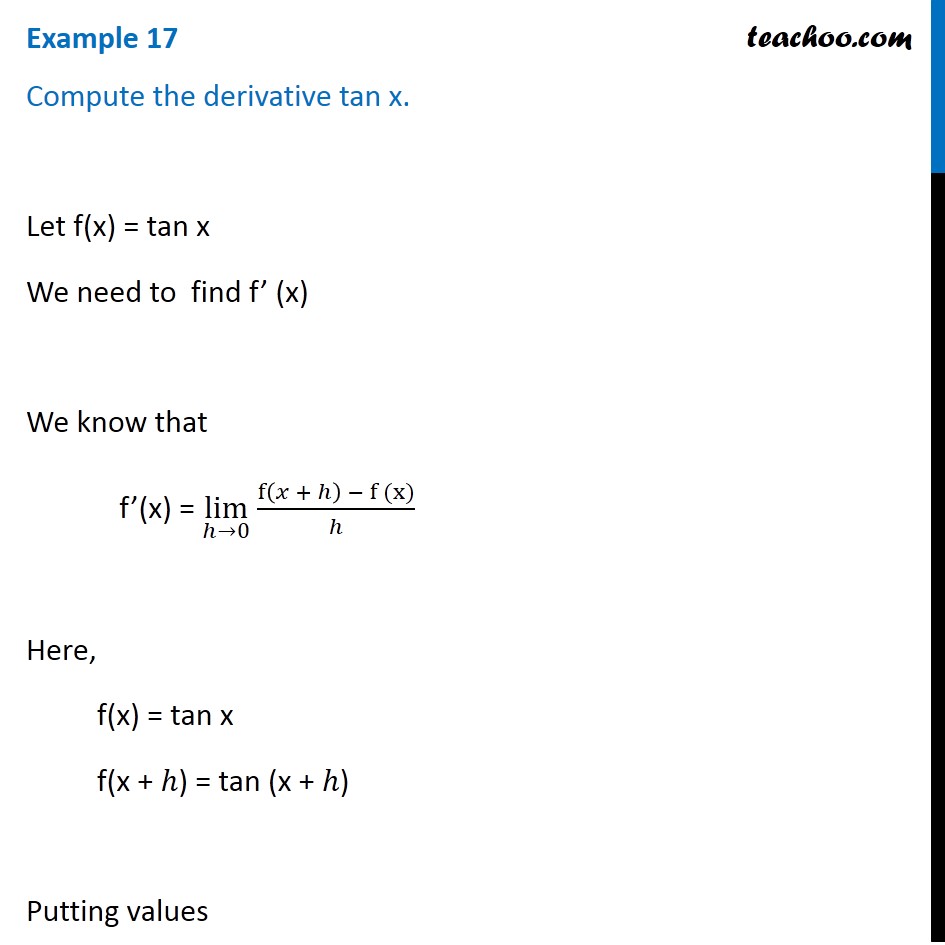
Derivada Tan X Estudiar
1 It boils down to: what do you mean by $\tan^ {-1} (x)$. I think most people think of it as the inverse tangent function, i.e. $\arctan (x)$, but some think of it as $\frac {1} {\tan (x)}$. The derivative of the former is $\frac {1} {1+x^2}$, and the derivative of $\tan (x)$ is $\sec^2 (x)$.

Derivative of Tangent x Formula, Rules, Examples
Differentiation of tan inverse x is the process of evaluating the derivative of tan inverse x with respect to x which is given by 1/ (1 + x 2 ). The derivative of tan inverse x can be calculated using different methods such as the first principle of derivatives and using implicit differentiation.
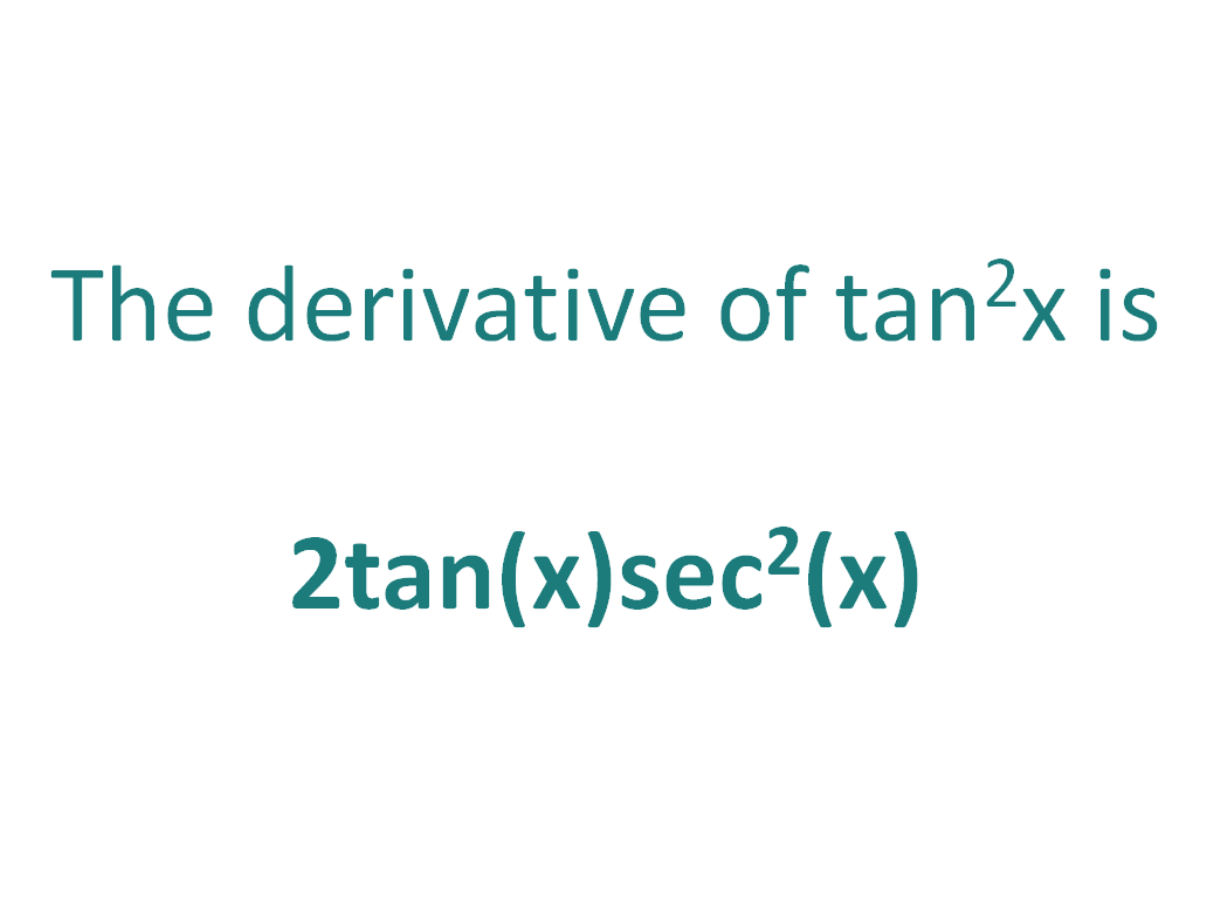
The Derivative of tan^2x DerivativeIt
All derivatives of circular trigonometric functions can be found from those of sin ( x) and cos ( x) by means of the quotient rule applied to functions such as tan ( x) = sin ( x )/cos ( x ). Knowing these derivatives, the derivatives of the inverse trigonometric functions are found using implicit differentiation .
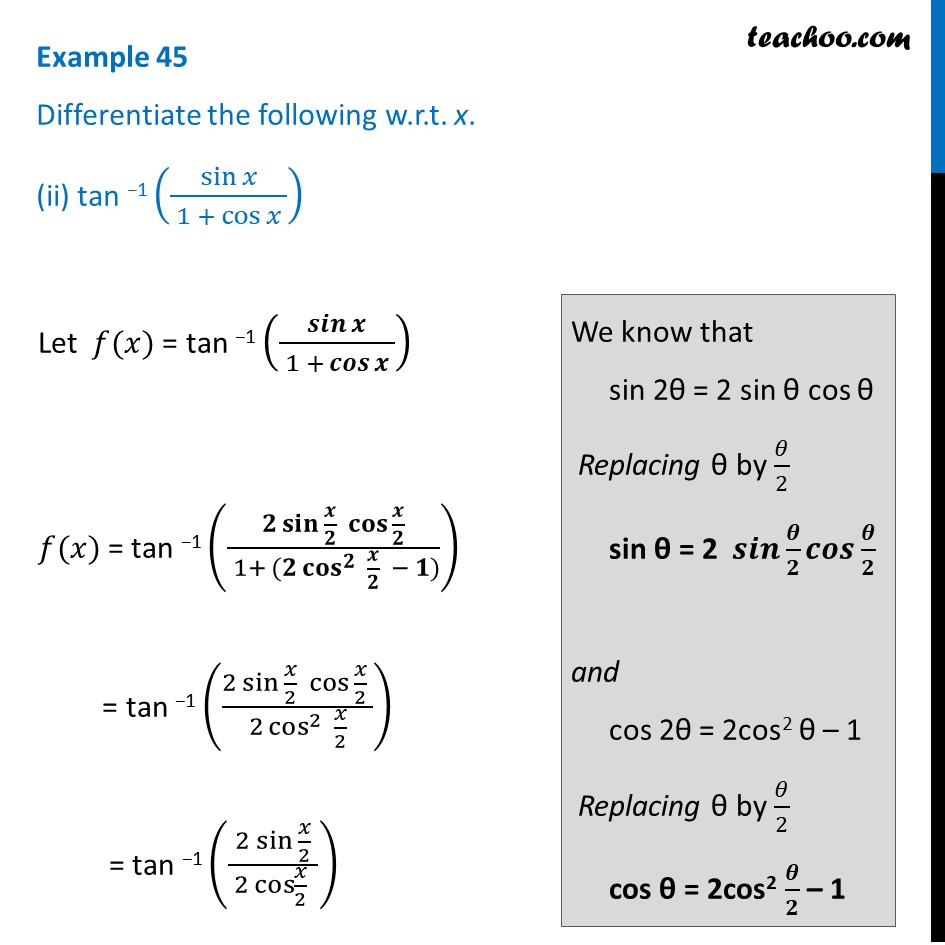
Example 45 (ii) Differentiate tan^1 (sin x/ (1 + cos x)) Teachoo
[Math Processing Error] Answer link I'm assuming you are thinking of this as being a function of two independent variables x and y: z=tan^ {-1} (y/x). The answers are \frac {\partial z} {\partial x}=-\frac {y} {x^ {2}+y^ {2}} and \frac {\partial z} {\partial y}=\frac {x} {x^2+y^2}.